- Getting around Lijiang. Dont stay in the Old Towns more than 2 days, there is nothing to do. KRISS Oct 9, 2013 05:46
- 2013 Beijing Temple Fair BENNYLAU Feb 26, 2013 03:29
- Malaysian traveling from KUL - LAX vis Shanghai PVG ZATI_DY Jan 3, 2013 20:15
An Inhospitable Hua Hu Excels in Hospitality
- Views: 4413
- |Vote: 0 0
- |Add to Favorites
- |Recommend to Friends
Like nomadic Tibetans have for centuries we have slept well and warm in our tent. It is one of a dozen circling a fenced compound of this loosely named ‘hotel’ in the middle of nowhere. There is an attraction here to justify our visit and the fee charged by the County Tourist Department. We like so many others that flock here during the warm May Holiday have come in search of the sweeping bend in the Yellow River, where Sichuan, Qinghai and Gansu share their borders. It’s touted as ‘The First Bend’ in the mighty river before it makes its long eastward journey to the sea.
Before we rise, we enjoy the warmth of the sun through the thin cloth of our tent. Our beds are sturdy stretchers fitted with an electric blanket, a doona and a yak wool blanket. A bare bulb hangs from the ridge pole inside the tent. Once the sun went down the temperature plummeted and we were last night happy to be invited to eat in the kitchen beside the warm pot belly stove where kettles boil non stop. We ordered dinner and watched a herd of yaks stream home in silhouette against a brilliant sunset. The kitchen is just one of several small rooms in a long, low, rough built dwelling down the slope from the camp. The back room housed a concrete water tank with two fresh sides of sheep or goat hanging from the ceiling. We took a very quick wash back there, rubbing shoulders with the carcasses as we did so.
We are in no hurry this morning, after all the only bus at our disposal isn’t expected until after nine thirty and does not pass by the lake. The alternative is to hitch a ride like we had done the afternoon before. And since our plan is to visit Hua Hu, a reportedly stunning lake, hitching offers us the best and quickest option to this beauty spot. Details about the lake are sketchy but whenever we mention where we are going, we always receive the same comment. “Ah, that’s a beautiful place.” We have no reason to doubt that it is in fact as beautiful as all reports. But we now have the little problem of how to get there.
Ever resourceful Wuyi, calls the family from Chengdu who had kindly given us a lift the day before. They agree to take us if we can meet them above the ‘bend’ at nine o’clock. This, our next challenge is quickly overcome. Inspectors from the Yellow River Fisheries Department have just finished breakfast and are going our way. Two big burly men make room for us in the back of their four wheel drive for the short trip back to Suokeji Si. And there we wait, watching our campers in the distance, packing up their gear. One of their children has walked up to the only toilets for miles around, and she relays the message that we are waiting for them as arranged.
Timber stairs thread up the hillside behind the temple to a vantage point that gives a wonderful panorama of rivers and plains, the grasslands dotted with yaks and the snow capped peaks of Qinghai in the distance. The three weathered old Tibetan women who so graciously opened their homes to us yesterday are sitting on the slope, prayer wheels turning, enjoying the sun and the holiday spectacle unfolding beneath them as cowboys and cowgirls entice tourists to take a ride up the slope or across the plains on one of their short wiry ponies.
We wait. The only bus to Ruoergai will be along any minute now. From our vantage point above the road and the river, I can see the little yellow bus approaching from some distance off. Wuyi waits patiently for a call as we watch our campers below. Incredibly, they were still packing. The bus rolls by, barely stopping and as we hesitate it rolls off. No sooner has it rounded the bend and slipped out of sight than the call we’ve been waiting on comes. With a ‘face saving’ excuse the family reneges on their offer just seconds after our only chance at public transport disappears from view.
On this day that has dawned so magnificently crisp and clear and promises to remain that way there is little point in stewing over what has just happened. Spending another day here stranded, beautiful as it is, will put us well behind schedule. With so many tourists in private vehicles, albeit not too many with room for two extra passengers and bags we have a slim chance of moving on. Again Wuyi goes off in search of help, striking up a conversation with a young man from Chongqing, although he has not lived there for over six years.
He now call Ruoergai home and works for the County Tourist Department and will later in the day be passing by Hua Hu and offers us a ride. On the surface this looks very promising but there’s a catch. He is waiting for some County Officials to arrive, then to have a meeting over lunch before continuing onto Ruoergai via Hua Hu. Our new friend however keeps us well entertained, driving us down nearer to the river, skimming rocks, collecting the unusual stones that can be found on the flood plains, explaining what water levels were like in the past and showing us photos of a stunningly beautiful wetland lake taken in the summer months.
By midday we find ourselves back at camp, waiting while our official friends finish lunch which I’m sure includes some local fish. Despite fishing bans on the Yellow River, last night we had been invited to go fishing, presumably on the White River below the camp. It is widely known that Chinese Officials can be rather a fickle lot and ours choose to be no exception. During lunch they rehash their plans for the afternoon deciding instead to visit Langmu Si that very large and very famous temple close to the border of Gansu.
Of course Hua Hu is beyond the turnoff to Langmu Si and our long anticipated ride evaporates before us and once again we are in the very same spot we that awoke on this most glorious of days. It is warm in the sun but a cool breeze blows ominously across the plains. We’ve missed breakfast and eat an apple as we contemplate our choices which are few. However our new friend continues working on our behalf, a friendly, helpful attitude of hospitality that pervades this inhospitable land.
We try our luck with other private cars but before long another County Tourism Entourage breezes through on their way the Hua Hu and is obliged to take us at least that far. All the while I’ve been wondering if it is this difficult just to get to the lake, what will it be like to leave? The road winds bend after bend beside the Yellow River for some miles. The plains are lifeless, or so they appear, except for the small dark earth mounds that give away the marmot burrows, a few soaring birds of prey and the occasional distant homestead surrounded with small black dots of the families herd of yaks.
The scenery is stunning in it’s almost monotone of light tans broken only by the upturned black earth and the herds of yaks and sheep. Raged razor edged ranges to the west rise sharply in contrast to the low rolling hills and flat plains that flank the river. Off in the distance on our right there is a change of colour in the depression. Could this be Hua Hu? By now I’m ready for almost anything but the sight now looming before us is anything but pleasing. Even before we leave the car I made a decision - a somewhat ridiculous decision in view of how our day was panning out - that I will not stop here for any longer than is absolutely necessary.
It’s almost two o’clock. There is a huge crowd of private vehicles in a bun fight at the narrow entrance to the reserve. At this time of the year there is precious little to admire even from this distance. The ticket price is Y58 and it’s a further 2 kilometers (the electric shuttle bus having died for the day) to walk to the waters edge and the eco friendly boardwalk. We are dumped unceremoniously outside the gate before our official vehicle makes its way effortlessly through the melee at the gate and disappears.
Hua Hu is a lake of dramatic seasonal changes. It lies in a depression that slowly fills with water as the winter snows melt. In these high altitudes the grasslands and lakes quickly blossom in the short summer months into a wetland paradise for migrating birds. Even as late as October it is a sight to behold and well worth the effort to get here. We had, incredibly, been led to believe that there is plenty of public transport out of here but it is quite evident that there is none and there never has been. No-one lives here and the few buses that pass through are infrequent at best. An hour later I watch two young Chinese backpackers alight from the only other southbound public bus we see all day.
Now that the Tourism Department has dispatched their duty in delivery us here, we turn to the only other Government Department in sight, the local police. Enquiries confirm that from here there is indeed no more public transport to anywhere. It is their job, and a great comfort to us, to ensure that all visitors safely leave this lonely isolated lake by nightfall – to ensure that no-one is left stranded here. They spend long hours and for them often boring days from eight each morning until dusk waiting and watching. Today they are lucky to have a slight distraction.
Across the highway a herd of goats grazes on what little grass is showing through the cold, dull surface soil. A dust devil dances across the plain, desperately trying to whip anything from the cold moist surface, scattering the skittish sheep as it passes by. Marmots – more numerous that people here – are curious and cautions as they bob their heads here and there, seldom straying long on the surface fearful of the eagle eyes patrolling overhead.
The afternoon is not entirely wasted. Five cyclists, well equipped for cold, wind, dust and long distance travel take a short break. They hail from Chengdu, all retired, average age of 51 and just days into an expected three month journey to Lhasa. They look fit and healthy and well prepared, planning to average 80/90kms each day and camping out each night. Today they have a useful tailwind to carry them over the cold barren pass into Ruoergai but it snows overnight and I wonder how they fair.
I spend my time writing and making small talk with the officers who invite me to sit with them in the police car. It’s out of the breeze, and warm. They are a pleasant bunch doing a pretty thankless job but we are eternally grateful that they are here for us today. We wait patiently for the promised ride and the last of the day. At five, two officers arrive, big men, both over six feet tall, they completely fill the front of the vehicle. Our bags are placed in the very clean trunk of a modern American Chevrolet. We express our thanks and say goodbye and before too long we are at the bus station in Ruoegai.
The officer waits quite some time for us to buy our tickets before taking us on to a hotel. One more hospitable service well beyond the call of duty as night sets in and the temperature begins to fall.



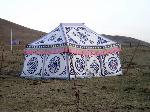
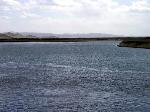
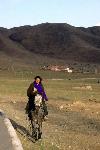
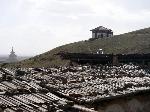
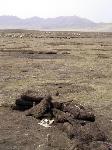
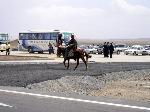
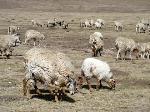
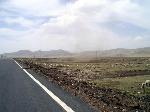
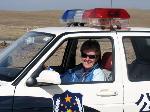
 Copyright © 1998-2026 All rights reserved.
Copyright © 1998-2026 All rights reserved.